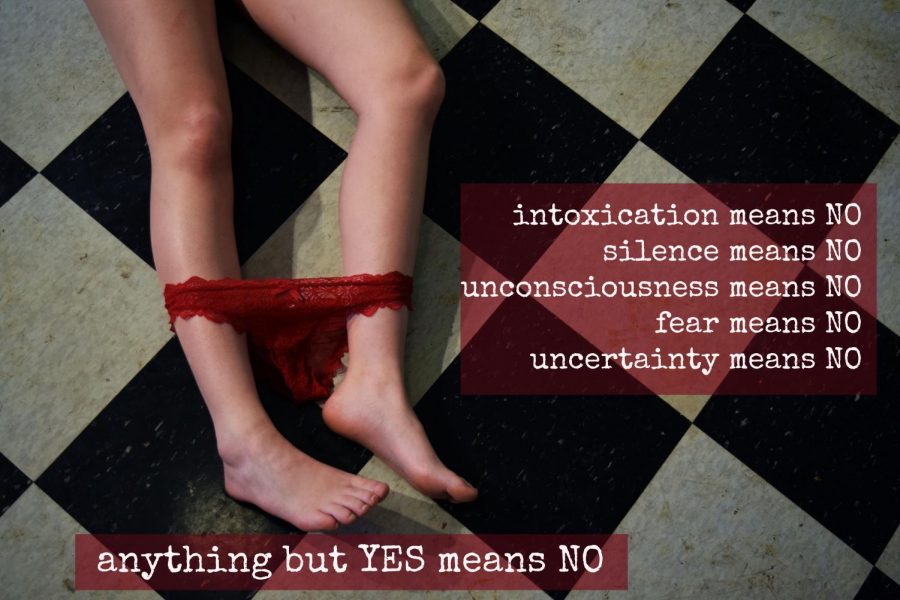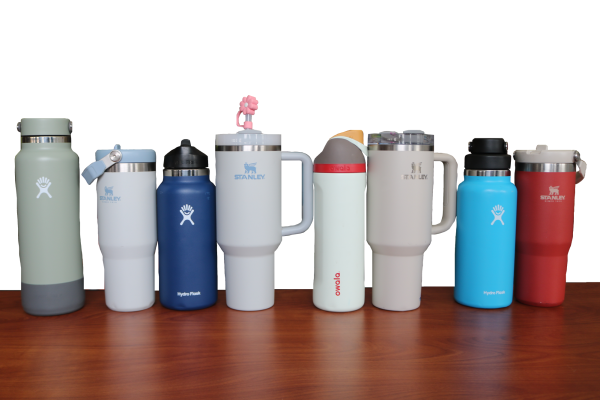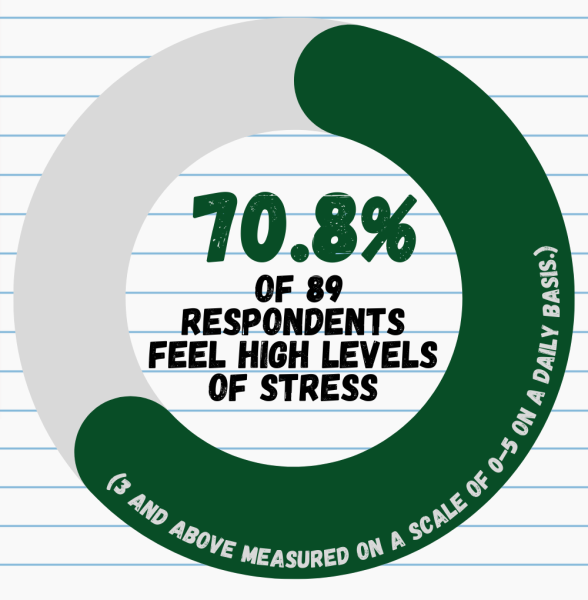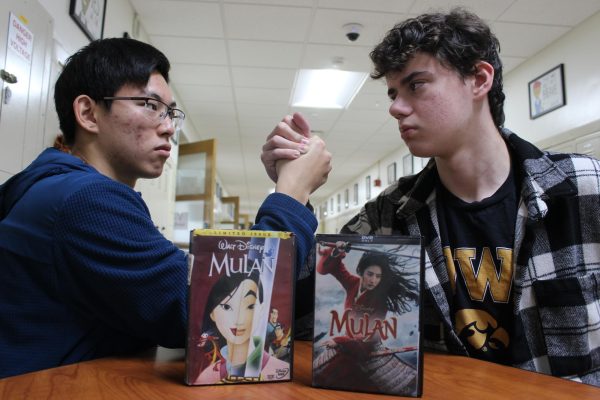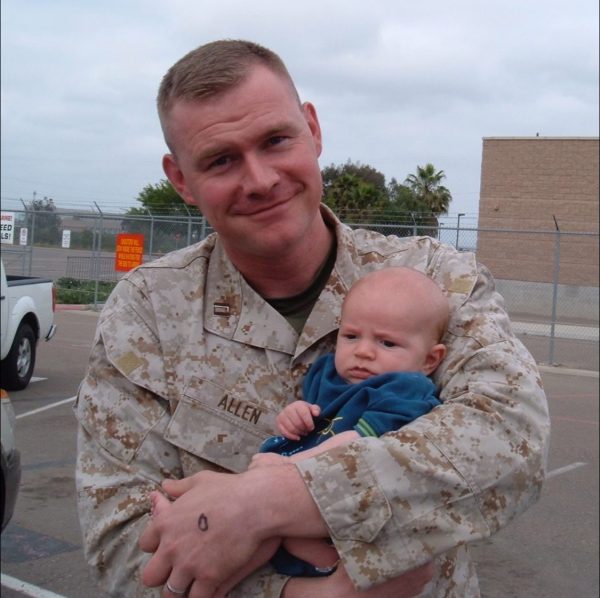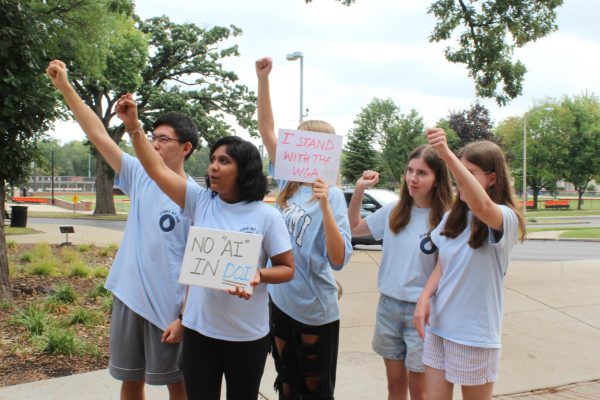The Blurred Line
Editors’ Note: This column is written anonymously by an LHS student. The writer is anonymous to protect their identity and their friends who have been affected by the sensitive nature of the content described. This anonymity was granted by the editorial board as an exception to our publication’s usual policy. This is an opinion piece, meaning the view expressed here is only the perspective of the writer, not that of the DOI staff as a whole. While we understand the photo is revealing and could be unsettling, we believe it is powerful and serves as a strong supplement to this story.
They told me how they couldn’t remember anything that happened that night. They were too drunk. They woke up in a bed naked and violated by someone that they had “slept” with the night before. They were taken advantage of. They were raped.
I’ve been told by about a dozen high schoolers case after case about who sexually assaulted them, how it happened and how it affected them. Sometimes they were blamed by their peers when they told them about what had happened, even though they are a survivor, not an assailant. They were told things such as, “You wanted it at the time, but you just regret it now” or “You’re being dramatic” or “You’re lying. That didn’t really happen to you.”
Please remember as you read this column that sexual assault and rape do occur, and that they happen to people in real life. In fact, it has most likely happened to people that you know. According to the Centers for Disease Control, about one in six boys and one in four girls are sexually assaulted before they turn the age of 18. That means that in your classroom right now, several teenagers could have already become victims of sexual assault.
Contrary to popular belief, the vast majority of sexual assault that occurs is not done violently by an armed stranger but rather by a person that the survivor directly knows. As reported by The National Institute of Justice, a research agency of the U.S. Department of Justice, “About 85 to 90 percent of sexual assaults reported by college women are perpetrated by someone known to the victim; about half occur on a date.”
Factors commonly associated with acquaintance rape include the presence of alcohol, no obvious physical injury and no weapon involved, states NIJ. The Office on Women’s Health, a government-run organization, explains that a person is not able to give consent if they are drunk, high or drugged. In reality, intoxicated sex is rape.
Throughout our childhood, intoxicated rape has been disguised as consensual sex in social media and pop culture. There are countless movies that depict teenagers going to a high school party and then stumbling upstairs to have sex in a bedroom. These movies glorify and normalize intoxicated rape, making it appear fun and casual. What these movies do not show is that those teenagers were impaired by substances and therefore cannot consent. They also do not show what the teenagers were thinking or how they felt about the encounter the next day.
The promotion of intoxicated rape also occurs in the music we hear. For example, the familiar pop song “Animals” by Maroon 5 normalizes rape culture, yet it still played on the radio for months and even ranked at number 3 on the Billboard charts in 2014. In the music video, a young woman is shown drinking at a bar and getting stalked by a young man who she clearly does not show interest in. The video switches between clips of her and clips of blood and animal meat.
While the video continues and becomes increasingly disturbing, the lyrics sing, “Baby I’m preying on you tonight, hunt you down eat you alive, just like animals…maybe you think that you can hide, but I can smell your scent for miles…you can’t stay away from me.” Other popular songs that glorify intoxicated rape include “Timber,” “Glad You Came,” and “Blurred Lines.” It is no wonder that teenagers get confused growing up watching movies and listening to music that normalize rape culture.
Because of the media, when I was younger, I thought that casual sex at parties with drunk and high teenagers was acceptable. It wasn’t until I had seen how many people these actions had traumatized that I realized the media was wrong. I was misled, like many people in our generation.
Confusion around consent can lead to devastation for both people involved. An intoxicated and uneducated person can rape someone else, meanwhile believing that what they are doing is okay and normal. Because the concept of consent is so often misunderstood, the assailant could be devastated after hearing an experience that they thought was consensual was actually traumatic for the person they experienced it with. The next day, valid and accurate accusations of sexual assault and rape may occur, and both of the people involved can suffer tremendously.
I saw this happen to my friend. At the time, he didn’t understand that what he did was not okay. He was never taught what consent looked like, and he struggled immensely because of it. He had to learn to cope with knowing what he did, the anguish that he caused to another person, despite never having the intention to hurt anyone. I hope that by writing this article, I can prevent someone from making a life-changing mistake that hurts multiple people like he did.
Obviously, rape is usually detrimental for the survivor of the assault. Sexual assault can lead to depression, panic attacks, post-traumatic stress disorder, self-harm, substance abuse, eating disorders, sleep disorders, suicide, as well as many other conditions, according to the Rape, Abuse and Incest National Network.
When alcohol, marijuana or other substances are involved, the line of consent becomes even more indistinct than it was before. There is no way to assume the position of the intoxicated person. There is no way to know whether or not the intoxicated person will remember that night. There is no way for the perpetrator to know if the intoxicated person truly wants to partake in the activity. Intoxicated sex is rape.
Likewise, waiting for a person to become drunk so they will be “willing” to have sex also qualifies as rape. The U.S. Department of Health and Human Services states, “[The aggressor] may take advantage of a victim who has already been drinking or encourage [them] to drink more than [they] might normally drink. If someone sexually assaulted you while you were drunk or passed out, they have committed a crime, no matter how much you had to drink or how old you are.”
Many teenagers have heard the phrase “no means no,” but what they haven’t necessarily heard is that silence is not the equivalent of giving consent or saying “yes.” According to the Health and Human Services department, “Consent is a clear ‘yes’ to sexual activity.”
Furthermore, consenting to an activity once does not mean that consent has been given for future instances. The choice can also be changed mid-activity; for example, if a person gives consent to have sex and once the activity has started they change their mind, they can tell the other person to stop and that request needs to be respected. Additionally, it is considered rape if someone is “threatened, forced, coerced, or manipulated into agreeing” to participate in intercourse, according to the Department of Health and Human Services. All people involved should be willing and active participants in the activity.
Although the laws of consent can be confusing at first, it is important that all people educate themselves. It may be hard to read about consent, especially if you have misunderstood the laws in past experiences, but what we can change is our present and future actions. Educate yourself on consent, not only to protect yourself, but also to protect the people that you care about. Do not risk crossing the blurred line between consent and sexual assault. Knowing the difference between the two can prevent lifelong consequences.
If you or someone you know has been affected by sexual assault, support can be found through the Zacharias Sexual Abuse Center in Gurnee, which can be reached at (847) 244-1187 or zcenter.org. You can also contact your counselor or social worker in your LST. Additionally, you can call RAINN’s 24-hour sexual assault hotline at (800) 656-4673.



